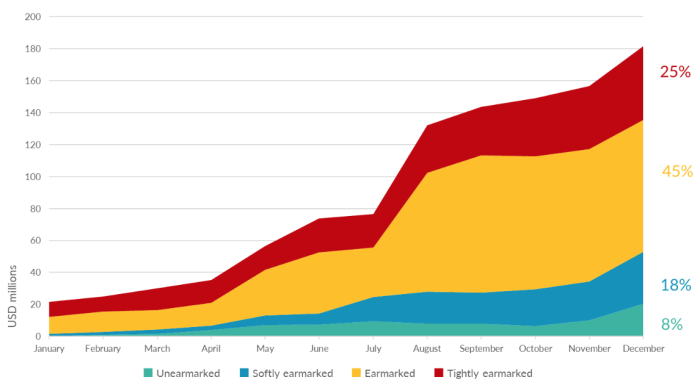On 20 September 2022, Uganda declared an outbreak of the Ebola virus, the seventh since 2000. The outbreak affected nine districts in the country, including the capital, Kampala, and Kyegegwa’s Kyaka II settlement, home to over 244,000 refugees altogether. From the onset of the outbreak, UNHCR put in place the Uganda Refugee Ebola Preparedness and Response Plan to support coordination of the response, complementing the Government’s efforts. In conjunction with this outbreak and ongoing efforts to support over 1.5 million refugees in the country, Uganda continued to witness a mass influx from the Democratic Republic of the Congo, with more than 150,000 new refugee arrivals in 2022. UNHCR declared an internal Level 2 emergency in April 2022 to be able to expedite the delivery of life-saving assistance to Congolese refugees seeking safety in western Uganda.

Uganda was the second largest recipient of unearmarked funding in the East and Horn of Africa and the Great Lakes region after Ethiopia, with $44 million received in 2022, accounting for 23% of UNHCR’s expenditure in the country. The largest tranche, $12.5 million, went towards improving health outcomes, including investment in cold chain equipment to ensure the availability of vaccines, transporting vaccines and the recording of vaccination data. The number of children vaccinated against measles rose by a third to 52,739 in 2022, from 39,096 in 2021, and 95% of births were conducted by skilled health workers. Village health teams in the community were trained to put pregnant women in touch with antenatal care clinics, and helped to increase men’s involvement in maternal and child health. UNHCR’s work in community engagement and women’s empowerment also benefited from flexible funding, which covered 35% of the expenditure on activities such as supporting elections in refugee settlements and training the leaders on topics such as abuse and misuse of power, gender norms and cultural beliefs, and community-based protection mechanisms.
$6.1 million of flexible funding was also deployed to cover well-being and basic needs, contributing to expenditure of $30.1 million, almost 97% of the needs foreseen in the annual budget. This enabled UNHCR to provide energy-saving cooking stoves to refugee households and schools, to train stove artisans, and to train people how to make and market the briquettes used as an alternative to firewood. In partnership with the National Forestry Authority, UNHCR also replanted 250 hectares of degraded forest. Investment in cash-for-work ensured that refugees could generate some income while maintaining 1,369 hectares of existing woodlands and plantations, and in some cases, landlords allowed refugees to grow their own short rotation food crops.
However, chronic underfunding continued to affect the refugee response in 2022. A financial shortfall of $154 million hampered the timely implementation of essential services, including the procurement of medicine for health services, fuel, and spare parts for fleet of some 460 vehicles, as well as the provision of core relief items (CRIs) and supplies such as soap and menstrual hygiene kits. Insufficient funding also led to the reduction of services such as essential health and education activities in the settlements.
The capacity to respond effectively to the new refugee emergency in western Uganda was also hampered by limited funding, with resulting delays in procurement and the deployment of CRIs.
While the Ebola outbreak was declared over on 11 January 2023, the need for flexible funding remains of vital importance for the Uganda refugee response to enable UNHCR and partners to ensure adequate provision of CRIs, transport for relocation of new arrivals from border areas to the settlements and life-saving assistance.